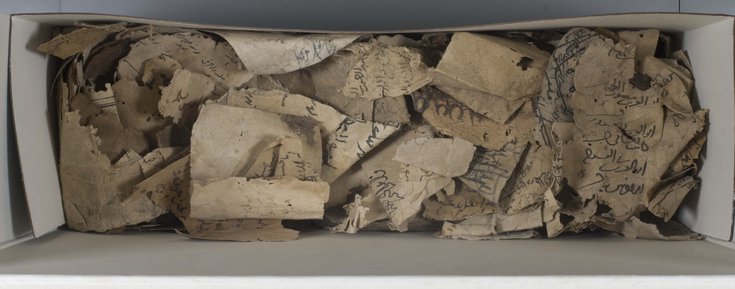Princeton Geniza Project
Accessing the medieval Islamic world through digital tools
Project team
Co-PI: Research Lead
- Marina Rustow
Co-PI: Technical Lead
- Rebecca Sutton Koeser
Project Manager
- Ksenia Ryzhova
User Experience Designer
- Gissoo Doroudian
Web Developer
- Ben Silverman
Researcher
- Alan Elbaum
Project Alums
- Nick Budak
- Stephanie Luescher
- Kevin McElwee
- Rachel Richman

During the 2020-2021 academic year, the CDH is partnering with the Princeton Geniza Project to expand access to the global Middle Ages through cutting edge digital tools.
The research partnership centers on the Cairo Geniza, a cache of roughly 380,000 fragmentary texts that survived in the attic of a medieval Egyptian synagogue. The texts span a thousand years of history, with most dating to between 950 and 1250, and cover an astonishingly wide geographic remit, stretching from Spain to Sumatra. This was probably the most geographically mobile society of the medieval world. The documents have also rewritten Jewish history in a time when an estimated ninety percent of Jews lived in the Islamic world.
Today, half of geniza fragments are housed in the Cambridge University Library, and the rest are dispersed among more than 60 libraries and private collections on four continents. The sheer diversity of the evidence, its fragmentary nature and its dispersal present special challenges to researchers. The fragments are also in multiple languages (mostly Judaeo-Arabic, Hebrew, Aramaic, Arabic and Ladino) and alphabets (Hebrew and Arabic). Together, these factors have limited the number of researchers who could access the material. But digitization has transformed geniza studies, and since the 1970s, Princeton has been at the forefront of it.
The Princeton Geniza Project is devoted to an important subset of geniza manuscripts: the documentary texts, which include letters, legal deeds, lists, accounts, and state administrative records. Documents hold singular information that is rarely reproduced in other sources, and thus far, they have rewritten the history of the medieval Mediterranean, and in particular of the Jewish communities on its southern and eastern shores. But there is much more to be done.
Particularly promising areas of research include trade, free and unfree labor, taxation, long-distance commerce, material culture, primary production and other areas of economic history in the Mediterranean and Indian Ocean basins. It has also offered precious information about how the Fatimid caliphs (909–1171) and Ayyubid sultans (1171–1250) governed their subjects, and how those subjects navigated and built Islamic and non-Islamic legal systems, as well as state and non-state administrative institutions.
In 1985, Prof. Mark Cohen and Prof. Avrom Udovitch (now both emeriti) founded the Princeton Geniza Lab (PGL) under the aegis of the Department of Near Eastern Studies to expand the range of geniza documents and supporting materials available to scholars, students and the general public; the Princeton Geniza Project (PGP) is its primary project. Under Mark Cohen’s leadership, the PGP digitized 4,350 transcriptions of Geniza documents and made them word-searchable. In 2015, Prof. Marina Rustow took over the directorship of the PGP and, together with Prof. Eve Krakowski, refocused the research team’s efforts on expanding the PGP’s documentary footprint and developing more robust metadata and discovery tools. The PGP now has 28,000 entries, accompanied by descriptions, tags and typologies by document genre.
The goal of the PGP–CDH partnership is to further facilitate research into these fragments by redesigning the research experience at the front and back ends. We are restructuring the project data and de-siloing the site’s digital components, which include images, metadata, searchable transcriptions, and non-searchable scans of specialists’ research notes, including those of the extraordinarily productive “grandfather” of documentary geniza studies, S. D. Goitein (1900-85).
The CDH-PGP research partnership will prototype a more intuitive and powerful user interface to search across the data and analyze it holistically. By streamlining the research process and making geniza documents more readily accessible to those encountering them for the first time, we also hope to inspire a new generation of researchers interested in premodern global history to integrate geniza documents into their studies and their scholarship.
CDH Grant History
- 2023– Long Term Support
- 2020–2022 Research Partnership